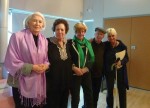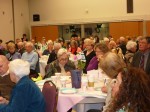At the recent Jewish Seniors Alliance of Greater Vancouver fall symposium, left to right: Peggy Casey, Lorilee Mallek, Nora Paul, Mark Godfrey and Grace Hann. (photo by Binny Goldman)
A capacity crowd of 175 gathered at the Peretz Centre for Secular Jewish Culture on Sunday, Oct. 26, to learn more about mental health and wellness, the topic of this year’s Jewish Seniors Alliance of Greater Vancouver fall symposium.
JSA president Marilyn Berger opened the session by asking the audience to rise in the name of mental health and to honor the soldiers who had lost their lives that week in Canada. This was followed by O Canada, led by Barbara Bronstein and Debbie Cossover, with Claire Cohen joining them in the singing of Hatikvah, and Marshall Berger accompanying on piano.
Gyda Chud introduced herself and co-convener Bev Cooper, and proceeded to inform those in attendance of the various projects that are JSA’s main concerns: advocacy, Senior Line Magazine, peer support counseling and the Empowerment Series. She went on to explain that the day’s topic had been chosen by attendees at past events, via the evaluation cards they had filled out citing this issue as a particular interest.
Cooper introduced the first speaker and the panel moderator, Dr. Penny MacCourt, past president of the B.C. Psychogeriatric Association, who admitted that she, too, will become a senior this summer.
MacCourt said that mental health is often equated with mental illness but that they are not the same thing. She emphasized the need to teach people ways in which to cope in the face of adversity; to help moderate the impact of stress, and facilitate social and emotional well-being. We as a society need to provide supportive living shelters, and continuous inclusiveness and access to such services, she said.
Help should be provided to those in need to maintain self-esteem and achieve effective coping strategies, she added, as these are the “protective factors” that can ease or ward off risks, including social isolation, limited income, loneliness, challenging life transitions, and lack of meaningful activity.
Dr. Martha Donnelly spoke next. At one time the director of the division of geriatric psychiatry at the University of British Columbia and a leader in the development of guidelines for geriatric mental health practice, she outlined some “red flag” symptoms of depression: appetite disturbance, loss of weight, early morning wakefulness, lower energy, and wishing life were over. The highest rate of suicide is in the senior years, she said.
One of Donnelly’s patients, Don Carroll, a very young 82, offered the audience a glimpse into his former work life, which included being an instrumental part of TV shows such as Mr. Dress Up and The Friendly Giant, and his subsequent descent into a depression from which he could not emerge on his own. With Donnelly’s continuing help, Carroll has returned to being an outgoing, fun, contributing person; a difficult journey for him, his supportive wife, Nancy, and family. It took resolute determination on all their parts to get Carroll to where he is now – off any medication and sharing with others his belief that one can heal with the correct diagnosis, therapy, doctor and support, to regain the ability to rely on oneself. The process was slow, including group therapy, daily exercise, medication and “thought catching,” tossing out negative thoughts before they take hold.
Grace Hann, who is currently working with JSA as a trainer and supervisor of peer support services, acknowledged JSA president emeritus Serge Haber for his vision to initiate the peer services as a vital project of JSA.
Hann is president of Senior Peer Counseling of British Columbia and on the YWCA board of the Community Action on Elder Abuse Project. She explained that it takes a peer to fully comprehend the feelings one is experiencing, such as loss of a loved one, age-related challenges, relocation, family discord – all situations that need empathy, which she described as “echoes of another person in ourselves.”
Hann called upon three graduates of JSA’s program to do role-playing, one of the methods used in the 55-hour course in peer counseling. They performed skits depicting examples of exchanges between clients and counselors at Week 1 and in Week 54. It showed the process through which the trainees had gone and from which they had grown from the initial expectations of their own abilities and finally gaining the knowledge and understanding of how to deal with the challenges clients face, such as loss of vision, a loved one and/or freedom and independence.
Trainees are taught to not use JAR: judgment, advice or rescue. Rather, counselors employ the three Es: empowerment, empathy and emotion. Both clients and counselors have benefited from the interactive sessions, said Hann, noting that there is a waiting list.
Hann then introduced a special guest, Tanja, 91, who, when Denmark was invaded by the Germans, secretly and at high risk to herself, helped Jewish adults and children escape to Sweden. Tanja shared that one of her most gratifying moments was witnessing the uniting of a mother with her child in a kindergarten when the war was over. She also shared that, many years later, here in Canada, when she was ill with cancer and reached out for help, she received empathy and understanding. Tanja was given a standing ovation by those attending, many of whom had been moved to tears listening to her.
The symposium came to a close with Berger thanking the speakers, presenting them with gift certificates. She made special mention of the co-conveners as well as JSA coordinator Karon Shear and the entire symposium committee for putting together such a successful event.
Refreshments and discussions followed. The audience left with much to contemplate but assured in the knowledge of where and to whom to turn should the need arise.
Binny Goldman is a member of the Jewish Seniors Alliance of Greater Vancouver board.


